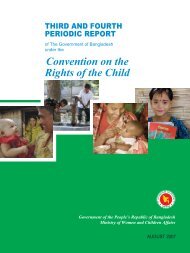Government-funded programmes and services for vulnerable - Unicef
Government-funded programmes and services for vulnerable - Unicef
Government-funded programmes and services for vulnerable - Unicef
Create successful ePaper yourself
Turn your PDF publications into a flip-book with our unique Google optimized e-Paper software.
Department of Social Development<br />
➔<br />
develop skills, create<br />
jobs <strong>and</strong> create<br />
income-earning<br />
opportunities.<br />
The DoSD is responsible<br />
<strong>for</strong> achieving these<br />
objectives by:<br />
increasing the number<br />
of registered ECD<br />
centres;<br />
increasing the number<br />
of children receiving<br />
the per-child ECD<br />
subsidy;<br />
increasing the value of<br />
the per-child subsidy<br />
in registered subsidised<br />
ECD centres.<br />
The NIP <strong>for</strong> ECD <strong>and</strong> the<br />
EPWP ECD plan identify<br />
the 2.5–3 million children<br />
living in poverty as the<br />
priority target <strong>for</strong> scaling<br />
up ECD in terms of the<br />
NIP.<br />
The provincial DoSDs<br />
are responsible <strong>for</strong> the<br />
bulk of the funding<br />
<strong>and</strong> implementation<br />
responsibility.<br />
Local government’s role<br />
is limited to inspection<br />
of ECD centres <strong>for</strong><br />
compliance with health<br />
<strong>and</strong> safety requirements<br />
<strong>and</strong> to the registration<br />
of ECD centres.<br />
The National<br />
Integrated<br />
Plan <strong>for</strong> Early<br />
Childhood<br />
Development<br />
xxxi<br />
The NIP <strong>for</strong> ECD has<br />
been developed to foster<br />
coordinated planning<br />
<strong>and</strong> action to address<br />
the comprehensive<br />
needs of young children<br />
(0–4) holistically<br />
through collective action<br />
by all government<br />
departments <strong>and</strong> roleplayers,<br />
including NGOs<br />
<strong>and</strong> community-based<br />
organisations.<br />
Targeted beneficiaries<br />
Vulnerable children,<br />
including those affected<br />
by poverty, disability <strong>and</strong><br />
HIV/AIDS<br />
A number of<br />
departments, including<br />
Social Development,<br />
Education <strong>and</strong> Health<br />
ECD centres<br />
Parents<br />
NGOs<br />
The NIP <strong>services</strong> <strong>and</strong><br />
<strong>programmes</strong> are divided<br />
into primary <strong>and</strong><br />
secondary <strong>services</strong> <strong>and</strong><br />
<strong>programmes</strong>, which are<br />
the responsibility of a<br />
range of departments.<br />
Primary <strong>services</strong> include:<br />
referral <strong>services</strong> <strong>for</strong><br />
health <strong>and</strong> social<br />
development <strong>services</strong><br />
(including grants);<br />
early learning<br />
stimulation;<br />
➔<br />
35
















